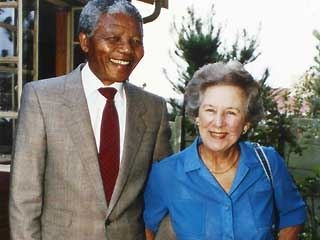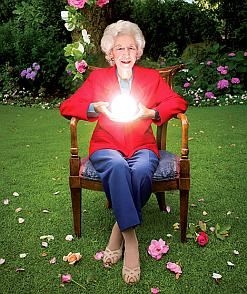 |
| Helen Suzman and Nelson Mandela (FOXNEWS.COM) |
The Apartheid system - a very racial and sad thing that went on in Africa. It was created by the Afrikaners (White Africans) in the 1930's. “The meaning Apartheid means "apart" a separation between three races, Bantu (Black African), Whites, and Coloureds (of mixed race).” (Robinson) A fourth category, Asian (Indians and Pakistanis), was added later. This law's goal was to make everyone who was different in separate groups. They would make laws that would separate nonwhites from certain areas. The laws also prevented Africans to own their own land. The whites wanted the other races to have the littlest amount of contact as possible between each other. Keeping bathrooms separate, jobs separate, education separate, and even the simple water fountains separate. The segregation that was going on was not equally right and needed to be stopped! While this was going on there were many attempts of Black Africans with white sympathetic supporters starting strikes, violence, sabotage, demonstrations, and strategies that often resulted in severe
In South Africa’s Apartheid there were many heroes that helped the dreadful separation end, Nelson Mandela, Miriam Makeba and more importantly Helen Suzman. Helen Suzman was born November seventh 1917. She was born and raised in Germiston, South Africa. Her parents were white Jewish immigrants named Samuel and Frieda. Her mother died two weeks after her birth. Her father later remarried and Helen got a new step mom. She wanted to go to school but local public schools wouldn’t accept Jewish girls. She then decided to live her life for God and went to the convent. Here she could learn, become closer to God and at the same time get an education. She continued her education and went to the University of Witwatersrand. She received her bachelor of commerce degree. She found herself more of an outsider as time went on because she was an English-speaking Jewish woman. She was noticed for her large public criticism of the governing national parties. She had visited Nelson Mandela many times knowing that he was formally in jail at the time. She was twice voted for the Nobel Peace prize and notably was awarded 27 doctorates. Suzman later died on New Years of 2009 in Johannesburg, South Africa. Many people cherished her in their lives, and she has changed people’s opinion on apartheid forever.
 |
| Helen Suzman Holding The Power in her Hands (Picasa Web Albums) |
Helen Suzman was a big part in Apartheid and how it succeeded. She was courageous, straight forward and was described by colleagues as bright and always happy. She was fearless and was lovely and light but cutting and caustic. What is carved on her tombstone “let right be done”, she knew what was right to her and that was all she needed. Helen Suzman is greatly famous for carrying the anti-racism banner in South Africa’s Apartheid Parliament. She became a United Party MP five years after the United Party was voted into office. In 1959 she and 10 colleagues disagreed in disgust resigned for the United Party refused to give more land grants to blacks and so Helen and her colleagues formed the Progressive Party (Progressive Federal Party). In 1961 the Progressives were almost all gone, except Helen, where she obtained her seat in the Johannesburg of Houghton. For 13 years she was a liberal MP, 6 of them she was the only woman amongst 165 men. She stood down amongst strong praise from all over the world as an MP and said she would ‘‘leave it to the others to be the watchdogs over abuse of power in the “new” South Africa that followed the fall of Apartheid’’ (Stanley). Helen Suzman’s efforts to end Apartheid did wonders and her efforts will not be forgotten for fighting in what she believed in.
MLA CITATIONS:
Uys, Stanley. " Obituary-Helen Suzman ." guardian.co.uk. 1 Jan. 2009. Wed. 18 Feb.2011.
http://www.guardian.co.uk/world/2009/jan/01/helen-suzman.
Murray, Kevin. Helen Suzman. 2002. Picasa Web Albums. Web. 18 Feb. 2011.
http://lh6.ggpht.com/__XVM4iCA-Ew/SWWwTm3GBSI/AAAAAAAAC9w/NamtTCgWUKU/helen-suzman-clover-text.jpg
James Robinson, Jr., Alonford Jr.. "Apartheid, social and political policy of racial segregation and discrimination enforced by white minority governments in South Africa from 1948 to 1994." africanaencyclopedia.com. Web.1.Jan
http://www.africanaencyclopedia.com/apartheid/apartheid.html.
Boddy-Evans, Alistair. "Helen Suzman." About.com. ©2011 About.com. All rights reserved. A part of The New York Times Company., 2011. Web. 1 Mar. 2011.
http://africanhistory.about.com/od/apartheideraleaders/a/bio-Suzman.htm.
Parkin, John. Helen Suzman and Nelson Mandela. 1990. The Huffington Post. Web. 1 Jan. 1990.
http://www.huffingtonpost.com/2009/01/01/helen-suzman-antiaparthei_n_154638.html.
Page created on 3/7/2011 12:00:00 AM
Last edited 3/7/2011 12:00:00 AM
